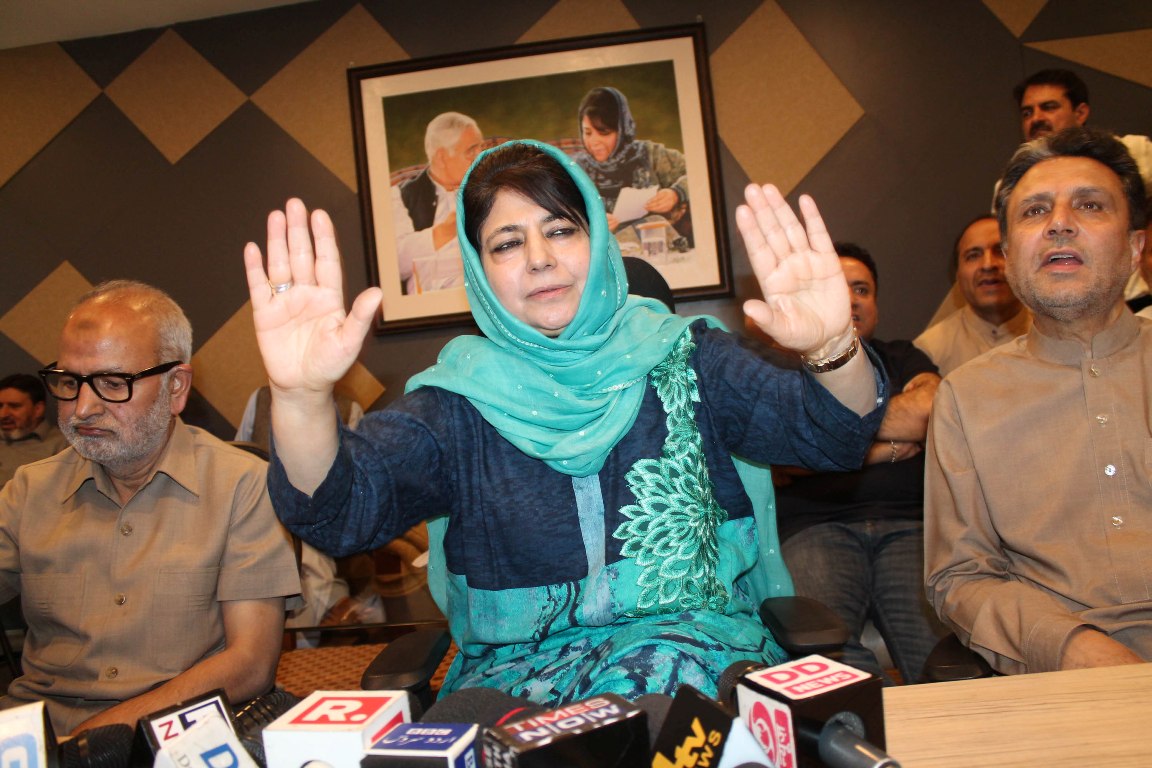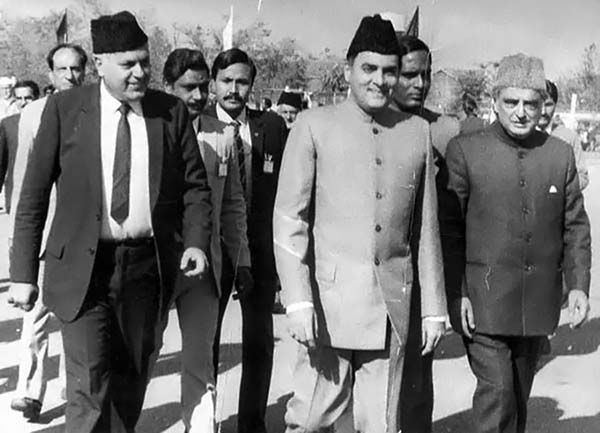by Altaf Hussain
Kashmir has often been described as a saga of betrayal and broken promises. By pulling out of the governing coalition in Jammu and Kashmir, Bharatiya Janata Party (BJP) has only added another chapter to the chronicle.
This does not take away from Mehbooba Mufti’s own failures. She has herself to blame for the wreck she is today. But more about that later.
First a look at the history of betrayals, which defines the attitude and approach of the Indian political class towards Kashmir.

KL Image: Bilal Bahadur
After the most influential Kashmiri leader of his time, Sheikh Abdullah, had abandoned the plebiscite platform in 1975, following his accord with the then Prime Minister Indira Gandhi, he was installed as Chief Minister with Congress support. But no sooner did Indira lose power at the Centre than her party withdrew support to the Sheikh, leading to dissolution of the Assembly.
In 1983, the Sheikh’s son, Farooq Abdullah, refused Indira’s offer of a seat sharing arrangement in Assembly elections which he won with a huge majority. But within a year, Indira toppled his government by engineering defections in the National Conference. Farooq’s brother-in-law, Ghulam Mohammad Shah, was made Chief Minister. Shah headed a coalition of his faction of the National Conference and the Congress for hardly two years before the Congress withdrew and the government fell.
A desperate Farooq then forged an alliance with Rajiv Gandhi, which was not taken gladly by his supporters, forcing him to rig the 1987 polls, obviously with Rajiv’s support. The rigging pushed the Muslim United Front (MUF) to the wall and all parties in the conglomerate have since joined the separatist camp; one of their candidates, Syed Salahuddin, is now supreme commander of the militant group, Hizbul Mujahideen.

By allowing rigging of the infamous 1987 polls, Rajiv put the party’s interest above everything else. Now, by breaching faith with the Peoples Democratic Party (PDP), the BJP has done exactly the same.
The saffron party played tricks with the PDP from day one. In the first days of the coalition rule, BJP ministers refused to hoist the state flag alongside the tricolor on their official cars. They also showed little interest in implementing the Agenda of Alliance which, among other things, promised dialogue with parties to the Kashmir conflict. Union Home Minister Rajnath Singh even failed to keep his promise, made during a press conference in Srinagar, that pellet guns would be used in Kashmir only on the rarest occasions. Recently, Singh had talked of talking with Pakistan and the Kashmiri separatists. But, he never followed it up with any serious move, not even a formal invite to the separatist leaders.
An impression is being created that the coalition broke, thanks to disagreement between the two parties over the unilateral ceasefire. But even if the PDP was unhappy with the ceasefire having been withdrawn, it did not murmur a word of protest. The PDP did nothing at all that would have obliged the BJP to part ways with it. In fact, Mehbooba went along with the BJP all along in supporting the security forces who put down the post-Burhan protests with a heavy hand, leaving nearly a hundred civilians dead, more than 10,000 wounded and hundreds blinded, fully or partially. She justified the killings by saying that the protestors should not have marched on the security forces’ camps. At a joint presser with Rajnath Singh, she made the infamous remark: “Did they go there to get toffees?” She blamed parents for letting their young sons join violent protests in the streets. Her statements further antagonised the people. The PDP’s much-touted healing touch changed into burning touch.

Many observers are of the opinion that the BJP broke up with the PDP with an eye on the 2019 general elections. They also point out that both parties had lost support among the people in their respective constituencies, viz Kashmir Valley and Hindu-majority areas of Jammu region. While Mehbooba failed to draw any tangible advantage – political or economic – from her alliance with the BJP, the BJP alienated its own constituents in Jammu region by poor performance of its ministers on governance front. The party adorned the coalition’s sinking ship in the hope of salvaging whatever little it can. But they ditched Mehbooba at a time when she had lost everything on the ground due to her alliance with the saffron party. For the people of Kashmir, the BJP has proved itself, and by extension the entire Indian political class, to be Chanakya bhakts and untrustworthy.
The Indian leadership gets away with this breach of faith because Jammu and Kashmir, with just six MPs in the Lok Sabha, is too small a state to have any say in or make any difference to India’s national politics. They have made Kashmir a pawn on India’s electoral chess board. But, they will have to realise – sooner the better, that Kashmir is a flash-point between two nuclear powers and its careless handling will be disastrous.
(The author is a freelance journalist; formerly North India Correspondent of the BBC, he also worked with the Times of India. He tweets @ayhussain.)
Scroll the Debate here















